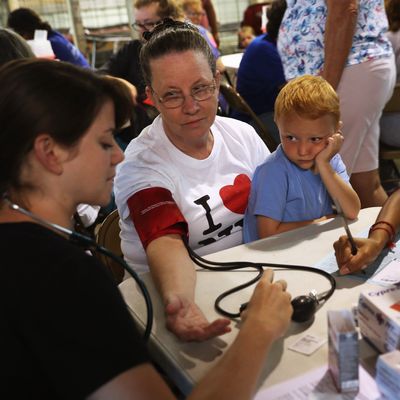
Twenty-seven million people in the world’s wealthiest country possess no health insurance of any kind. Millions more have coverage too skimpy to use for nonemergencies. Last year, a record-high 25 percent of Americans told Gallup that they or one of their family members delayed treatment of a serious condition out of concern for the cost of seeking care. And it isn’t hard to see why: The average deductible for an individual with employer-sponsored insurance has increased by 162 percent since 2009.
More than 33 million Americans lack access to paid sick leave. About half of all service workers (among them, line cooks and elder-care workers) cannot take a day off without losing pay. Meanwhile, thanks to our nation’s weak labor unions and at-will employment policies, many workers who do officially have paid leave are too afraid of repercussions to use it.
The American right has long argued that our nation’s aberrantly threadbare safety net makes us all freer (“small government,” in its majestic equality, liberates the rich as well as the poor to choose whether health coverage is right for them, or whether a premature death would be preferable to plunging their families into financial ruin, or whether they want to fire their workers for calling out sick). But as coronavirus has begun making its presence felt in America’s intensive-care units, Republicans have begun to realize that denying tens of millions of people the right to see a doctor — or stay home when sick without falling behind on rent — may actually impose some costs on society as a whole!
“You can look at it as socialized medicine,” far-right GOP congressman Ted Yoho said of providing free coronavirus testing and treatment to the uninsured this week. “But in the face of an outbreak, a pandemic, what’s your options?”
The Trump administration is reportedly considering tapping national-disaster funds to compensate hospitals and doctors who provide care to uninsured coronavirus patients free of charge. Treasury Secretary Steve Mnuchin said Tuesday that the White House was considering measures to subsidize the incomes of workers who lack paid leave.
For the moment though, these concessions to the reality that (contrary to libertarian dogma) human beings aren’t wholly autonomous individuals — but rather, inescapably interdependent social animals — remain merely hypothetical. Congressional Democrats are pushing for the passage of legislation to permanently require all firms with 15 or more workers to guarantee those workers with seven days of paid sick leave a year. But the administration has shown little interest in anything more than emergency expedients.
Which is unfortunate. This year’s burgeoning pandemic has made the high social costs of our skimpy welfare state more profound and readily apparent. But even in ordinary times, the needless harm our society inflicts on its least fortunate trickles up to the rest of us.
In one sense, this point is obvious: If the absence of universal health care and paid leave abets the spread of coronavirus, it surely does the same for more quotidian infectious agents. One recent study found that when states require employers to provide paid sick leave, influenza infections fall by more than 10 percent. There are also quantifiable ways in which failing to provide Americans with access to health care imposes cost on society at large. For example, there is some evidence that the financial insecurity and medical deprivation that low-income Americans suffer when they lack health insurance impedes their capacity to work: In Michigan, Medicaid expansion was associated with an increase in labor-force participation among low-income and nonwhite residents. Meanwhile, when Americans forgo early treatment of an ailment due to cost concerns, they often end up requiring even more expensive care — and suffering worse health outcomes — than they would have otherwise.
Such economic costs of social deprivation are compounded by less easily quantifiable ones. When a cash-strapped father starts rationing necessary medications, the resulting decline in his well-being can adversely impact his children. When losing one’s job means losing one’s health care, it is riskier for workers to report the sexually predatory behavior of abusive bosses, and thus, harder for our society to root out institutional sexism. And, of course, when someone dies from a treatable illness for want of affordable care, the loss is not just that individual’s, but also their family’s, friends’, and community’s.
The collective costs of America’s underinvestment in social welfare aren’t limited to issues of sickness and health. Our country’s exceptional refusal to provide unconditional income support to needy families likely reduces our collective prosperity: A 2015 study from the National Bureau of Economic Research found that direct cash assistance to low-income households with small children significantly increases such children’s odds of attaining a college degree and being employed by age 25. That finding is buttressed by research showing the long-term benefits of America’s food-stamp program. As the New York Times’ Neil Irwin noted in 2017:
[T]he food stamp program was introduced gradually in the United States from 1961 to 1975. Hilary Hoynes of the University of California, Berkeley, Diane Whitmore Schanzenbach of Northwestern University and Douglas Almond of Columbia University have found that low-income children who benefited from the program were healthier and more likely to be working decades later than otherwise similar children in counties where the program arrived later.
Nevertheless, the Trump administration is doing everything it can to reduce access to nutritional assistance.
All of which is to say: Coronavirus may lead Republicans to observe a truce in their war on social insurance. But if conservatives don’t make broader revisions to their antisocial worldview in the face of this epidemic, American society will stay sick long after coronavirus has passed.






























